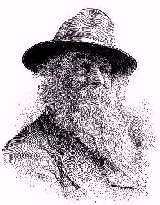
Born: May 31, 1819, in West Hills, near Huntington, Long Island, New York, United States
Died: March 26, 1892, in Camden, New Jersey, United States
Walt Whitman is considered one of the greatest American poets. His style is solidly American, with colloquial language and descriptions of common events. Whitman's work was recognized in European countries before his popularity grew in his own locale.
Whitman was the second of nine children. His father was a carpenter who moved the family to Brooklyn when Walt was four years old. He went to public school for six years and then was apprenticed to a printer. After an apprenticeship of two years, he started working as a printer himself.
One of Whitman's first works, The Half-breed and Other Stories, was published in 1927. However, like most of his early works, this volume was undistinguished. In 1835, he started teaching in Long Island and began editing The Long- Islander, a newspaper in Huntington. Many believe that he also hand delivered the paper.
In 1839, Whitman returned to New York where he enjoyed luxuries that hadn't been available in the country, such as theater, opera, and libraries. For the next several years, he worked in New York and New Orleans as a printer and journalist. For a brief period, he was associated with the Tammany Hall Democrats, but this ended when he printed radical editorials in papers such as the Brooklyn Eagle.
It was in the New York area that he began his poetic career. With a borrowed press and his own money, he printed the first run of his best-known work, Leaves of Grass in 1855. This first run was comprised of twelve untitled poems, which included Song of Myself. The volume is noted for its radical, irregular style and content, which strongly contrasted with the sentimental rhymes that were popular at the time.
With the encouragement of Ralph Waldo Emerson regarding Leaves of Grass, Whitman published a second edition in 1856, adding twenty new poems, including Crossing Brooklyn Ferry. He continued to use his contacts to publish six more editions of the book, adding more poems to each publication. Themes, which changed with each additional collection of poems, range from nationalism to sexual love. Some interpretations see the sexual love as homosexual in nature, reflecting the poet's own preferences.
Whitman nurtured the wounded during the Civil War, a work that influenced his writing. His poems often voice a hope for peace between the two sides. After the war, he worked in the government until he was partially paralyzed by a stroke.
Whitman lived with his brother until his death. Near his death, he wrote A Backward glance O'er Travel'd Roads as a resolution to his life.